Editor:
Brandon Sweet
University Communications
bulletin@uwaterloo.ca
78,000+ vaccine doses
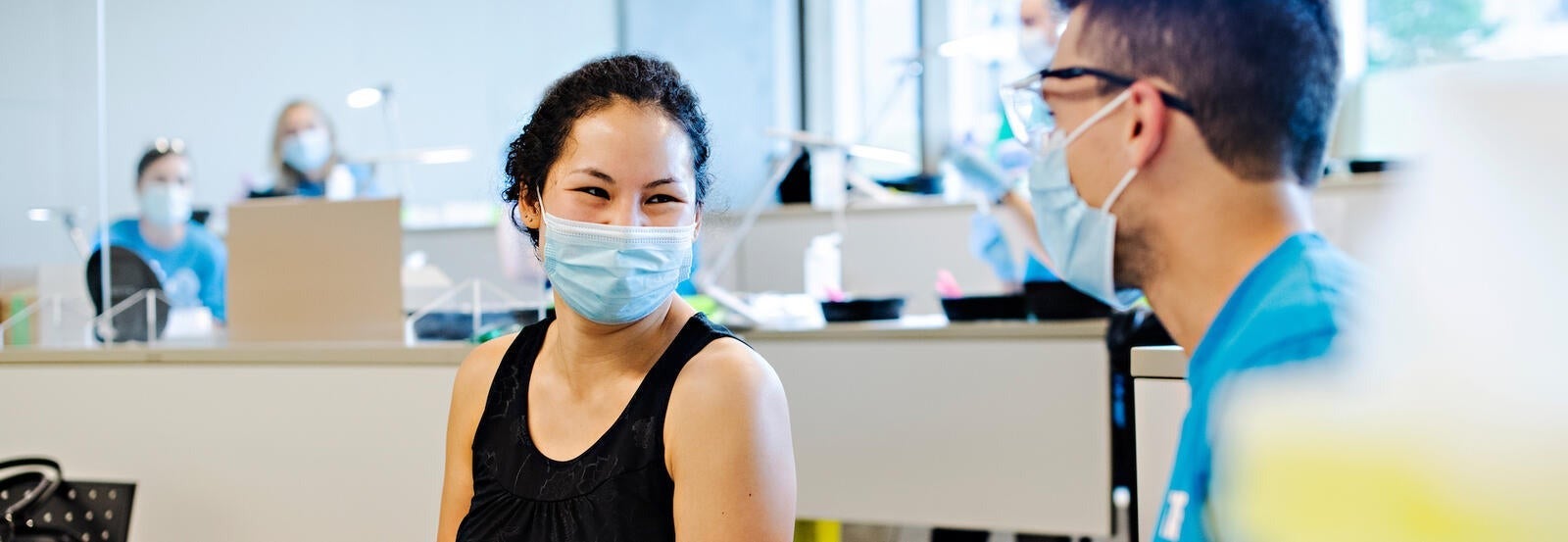
By Alana Rigby. This article was originally published in the fall 2021 issue of Waterloo Magazine.
It became known as the happiest place on Earth.
The Health Sciences Campus COVID-19 Vaccine Clinic was a place of connection – an exciting step toward ending the pandemic.
Led by the Centre for Family Medicine Family Health Team, it was housed in the University of Waterloo School of Pharmacy in downtown Kitchener between March and August 2021. It became a beacon of hope and an opportunity for dozens of Waterloo alumni to find purpose in some of the most difficult days of the pandemic’s third wave.
“Partnering to support the clinic was essential for us,” says Andrea Edington, Hallman director of the School of Pharmacy. “Our community has been nothing but welcoming since our School opened in 2009. We were thrilled to give back by lending our space and expertise to this important cause.”
The clinic saw tears of joy from people who had been separated from loved ones and smiles behind the masks of alumni who felt connected to the global effort to save lives.
Smiles and selfies
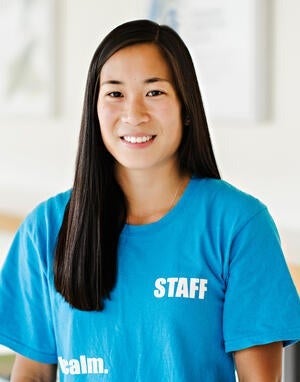
When Ai-Leng Foong-Reichert (PharmD ’18, PhD in progress) oversaw vaccine preparation at the clinic, not a day went by without people expressing gratitude.
Foong-Reichert found renewed strength from being back in the School of Pharmacy at a time when completing her degree remotely was wearing on her.
“I’d stop and think: ‘Here I am, carrying out this specific task, seeing people’s joy, and there are people just like me doing this same task in vaccine clinics all around the world.’ It was a humbling realization.”
Foong-Reichert was moved by the sight of an older man struggling to take a selfie after his vaccine. “I smiled because I knew he was sending it to his grandchildren. That sense of relief and excitement, getting back to some sort of normal – it’s what connected us all.”
Doing his part to end the pandemic
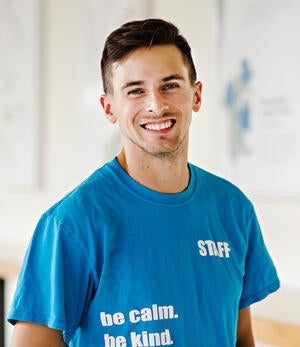
Joey Champigny (PharmD ’20) was one of many pharmacy alumni who worked at the Health Sciences Campus clinic. “I remember sitting in the lecture hall learning about infectious disease,” Champigny says. “I never thought that later I’d be sitting in that same seat, giving someone a COVID-19 vaccine.”
Champigny was an immunizer and trained local health-care provider on vaccine preparation. “I was completing a residency and working part-time, but I knew I had to support the clinic,” he says. “I didn’t want to look back and think I could’ve done more to end the pandemic.”
Contributing as a family
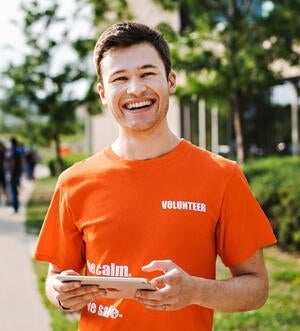
Ryan Tennant (BAS ’19, MASc ’21, PhD in progress) grew up in a family of extroverts, so when he heard the vaccine clinic was looking for volunteers, he wanted to get his whole family involved.
Along with his parents Dave (BES ’79) and Sherri and his sister Lia (BSc ’13, MSc ’16), Tennant guided people from the parking lot to check-in stations, answered questions and provided support to patients and staff.
“I met people I hadn’t seen in years: former teachers and school friends. My shifts were full of those ‘small world’ moments connecting with people,” Tennant says.
His volunteer experience also inspired Tennant’s PhD research. The engineering student, working with many collaborators, designed an app to improve workflow in the clinic and minimize wasted resources.
Tennant hopes the app can be used in clinics around the world: “It’s been invigorating to design a solution that’s so immediately useful.”
Leadathon addresses the grand challenges of Canadian Engineering
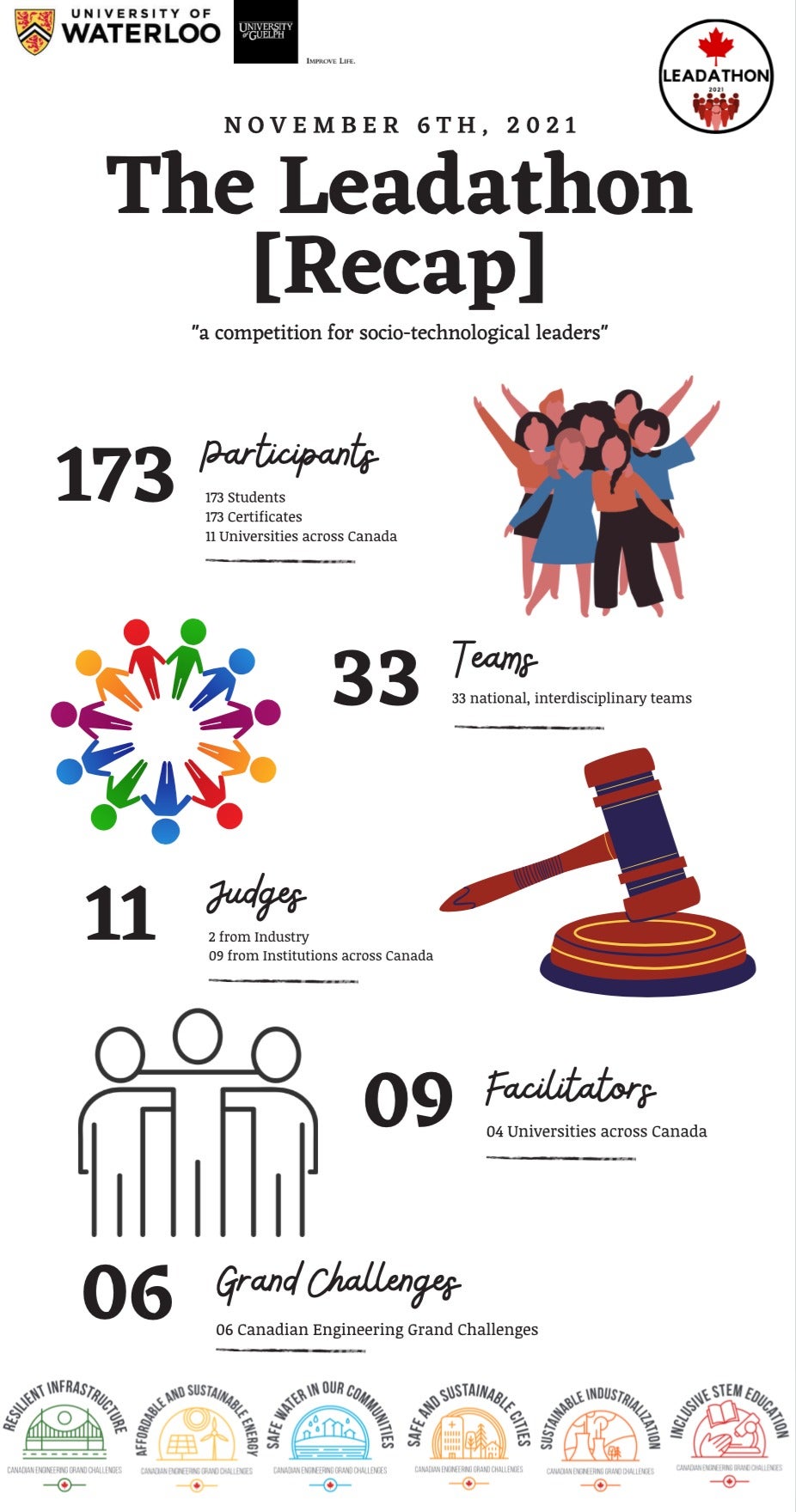
On Saturday, November 6, 2021, the University of Guelph and the University of Waterloo hosted the first engineering Leadathon, the culmination of a project supported by the D2L Innovation Guild, and built upon the foundations of the Student Leadership Program at Waterloo and the Guelph Engineering Leadership (GEL) Program.
The Leadathon was a national competition held online, aimed at developing the leadership mindset in engineering students looking to solve the complex socio-technical challenges facing the world today. Leading the project was a team of three faculty: John Donald (University of Guelph), Christine Moresoli (University of Waterloo) and Nadine Ibrahim (University of Waterloo); and five engineering students: Tiana Bressan, Sania Azim, Grace Ly (University of Guelph), Monika Mikhail and Melissa Martin (University of Waterloo). On event day, an additional 9 student facilitators and 11 judges from multiple Canadian institutions helped support the event.
Centered around the six Canadian Engineering Grand Challenges (CEGC) identified by Engineering Deans Canada, the six CEGCs are:
- Resilient infrastructure
- Access to affordable, reliable and sustainable energy
- Access to safe water in all communities
- Inclusive, safe, and sustainable cities
- Inclusive and sustainable industrialization
- Access to affordable and inclusive STEM education
Participating student teams were prompted to create a ‘Decade of Action’ plan to address a selected CEGC to make Canada a better place.
Teams had an hour and a half to create, finalize and submit their ‘Decade of Action’ plan. They focused on creating relevant, creative and realistic solutions and goals to address their selected CEGC while keeping design and communication in mind for their submission. All teams prepared engaging presentations with well structured goals and solutions, impressing the judges with their creativity and innovation.
Overall, this inaugural Leadathon was a great success, with students noting that working with their teams they gained leadership and teamwork skills and developed a better understanding on how to generate ideas to address the complexity of the CEGCs. One student participant noted that the leadership skills they developed included “thinking quick, creatively, critically, and profoundly to map CEGCs; explaining and justifying my personal recommendations/thoughts in the breakout sessions, while also listening to others.” A total 173 students participated from 11 Canadian Universities, making up 33 teams with three teams receiving prizes for the best overall, most innovative, and most applicable plans. The teams in each category were:
Best overall: Resilient infrastructure
Almog Waisenberg, Alex Wang, Christopher Ungureanu, and Mark Bastianello (York University)
Most applicable: Affordable, reliable and sustainable energy
Aditi Maheshwari, Lauren Streitmatter, and Cassey Shao (University of Toronto)
Most innovative: Access to affordable and inclusive STEM education
Minjeong Kang, Mayokun Moses ((University of Manitoba), Steven Hoa-Le, Ausad Kahlon, Janush Loganathan (York University).
Improving perceptions of emerging technologies can help ease strain on health-care systems

This article was originally published on Waterloo News.
More attention must be paid to improving perceptions of emerging technologies like AI-powered symptom checkers, which could ease the strain on health-care systems, according to a recent study.
Symptom checkers are online platforms that help with self-triage based on a range of inputted symptoms and demographic details.
The study, led by University of Waterloo researchers, found that “tech seekers,” people who are open to technology but perceive a lack of access to it, are the most likely to want to use the technology—more than “tech acceptors,” people who are both open to it and perceive it to be accessible.
The least likely group of people to adopt the tool are “tech rejectors,” those who do not view it as accessible and have a negative view of AI. In between were “skeptics,” who have concerns about trust and output quality, and “unsure acceptors,” who do not perceive access to be an issue but have negative perceptions about AI.
“These findings should be of great interest—or concern—to the three active arms of any health-care system that intends to use AI-driven symptom checkers: prospective patients, medical experts and developers of AI-driven symptom checkers,” said co-author Ashok Chaurasia, a professor in the School of Public Health Sciences. “This study highlights the need for more collaboration between these groups to improve AI models and their perception within the general population and medical experts.”
Stephanie Aboueid, the study’s lead author and a School of Public Health Sciences graduate, said, “This technology is very promising in the health-care sector, given that it has the potential to reduce unnecessary medical visits and address the lack of access to primary care providers.”
The researchers surveyed 1,305 university students aged 18 to 34 who had never used a symptom checker before the study. They gathered data on trust, usefulness, credibility, demonstrability, output quality, perspectives about AI, ease of use and accessibility for the analysis.
“Symptom checkers are important because they speak to the younger generation who value timeliness and convenience,” Aboueid said. “They are not just a fad, as we’ve seen with Babylon, for example, which recently went public and has been adopted by various health institutions.
Aboueid said the researchers used university-aged responders for the study because they are typically eager adopters of technology. Because of the age group studied, high education levels and good health status, additional studies are needed in other populations with wider age ranges, education and health levels, the researchers said.
The study, “Latent classes associated with the intention to use a symptom checker for self-triage,” was co-authored by Waterloo researchers Stephanie Aboueid, Samantha Meyer, James Wallace and Ashok Chaurasia and published in the journal PLOS One.
Writing and Communication Centre releases annual report
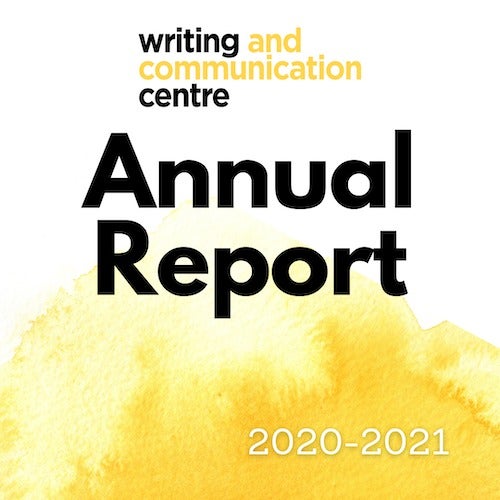
A message from the Writing and Communication Centre (WCC).
The Writing and Communication Centre (WCC) is excited to announce the release of our 2020-21 Annual Report. During an unusual and challenging year, the WCC continued to support students, postdocs, and faculty in all of their academic, research, and professional communication activities.
As we did last year and going forward, the WCC will be publishing our annual reports in a digital format to prioritize accessibility, cost-efficiency, and sustainability. The 2020-2021 Annual Report is now available on our website.
IST celebrates Sandra Laughlin

"Please join me in congratulating Sandra Laughlin on her upcoming retirement," writes Lisa Tomalty, Manager, Customer Relations and Support in Information Systems and Technology (IST). "Sandra’s last day of work will be December 23, 2021."
"Sandra has been a staff member at the University of Waterloo for over 39 years. She joined IST (Department of Computing Services) in 1982 as an I/O Operator. In 2003, Sandra took on the role of Site License Software Coordinator in IST. As part of this role, she was responsible for procuring and renewing software licenses and arranging contracts with large numbers of vendors, for IT staff, faculties and labs. She also taught and assisted with Skills for the Electronic Workplace (SEW) courses. Later she also took on roles of co-chair of our Professional Development Advisory Group (PDAG) and was responsible for facilitating and arranging many of the excellent IT sessions we have enjoyed on Friday mornings, as well as the role of coordinator of our IT Professional Development (ITPD) program."
"Over her years of service, Sandra has interacted with staff, faculty and students across campus, as well as with many of our vendors, including Microsoft, Oracle, and Softchoice, among others," Tomalty continues. "Sandra is a respected and valued colleague in IST and across campus. Her friendly and efficient approach to her work and interactions, as well as her attention to detail, dedication and sense of humor, will be greatly missed."
"On behalf of everyone in IST and many across campus, I would like to thank Sandra for her dedication to the University of Waterloo, her clients and colleagues. We wish Sandra all the best in retirement."
Link of the day
Mel Lastman, a mayor like noooobody else
When and Where to get support
Students can visit the Student Success Office online for supports including academic development, international student resources, immigration consulting, leadership development, exchange and study abroad, and opportunities to get involved.
Instructors looking for targeted support for developing online components for blended learning courses, transitioning remote to fully online courses, revising current online courses, and more please visit Agile Development | Centre for Extended Learning | University of Waterloo (uwaterloo.ca).
Instructors can visit the Keep Learning website to get support on adapting their teaching and learning plans for an online environment.
Course templates are available within your course in LEARN to help you build and edit your content and assignment pages quickly.
The following workshops, webinars, and events are offered by the KL team (CTE, CEL, ITMS, LIB):
- Independent Remote Course Design Essentials, self-directed, continuous self-enrollment course in LEARN.
- Independent Blended Course Design (iBlend), self-directed, ongoing
- Copyright Overview for Waterloo Instructors and Staff - self-directed, continuous self-enrollment course in LEARN.
-
Getting Started in LEARN (CTE6656), Friday, December 10, 10:00 a.m. to 12:00 p.m.
-
Getting Started in LEARN (CTE6656), Wednesday, December 15, 1:00 p.m. to 3:00 p.m.
Employees can access resources to help them work remotely, including managing University records and privacy of personal information. Here are some tips for staying healthy while working from home.
Stay informed about COVID cases on campus by consulting the COVID case tracker.
The Writing and Communication Centre has virtual services and programs to help undergrads, grad students, postdocs and faculty members with academic writing.
- Meet with writing advisors in one-to-one appointments to brainstorm, draft, revise, and polish. No time for an appointment? Try email tutoring for undergrads.
- Beat isolation and make writing progress at weekly Virtual Writing Cafés for grad students and faculty or PJ-Friendly Writing Groups for Undergrads.
- Take an online workshop or apply to our popular Dissertation Boot Camp program.
- Faculty can request custom in-class workshops for their courses, or the WCC can facilitate any existing workshops for student groups.
Co-op students can get help finding a job and find supports to successfully work remotely, develop new skills, access wellness and career information, and contact a co-op or career advisor.
The Centre for Career Action (CCA) is offering some in-person services for fall 2021. The Tatham Centre is open with front-desk support, limited in-person appointments and co-op consults. Services are also available virtually. Book an appointment online or Live Chat with our Client Support Team. The CCA is here to help.
If you feel overwhelmed or anxious and need to talk to somebody, please contact the University’s Campus Wellness services, either Health Services or Counselling Services. You can also contact the University's Centre for Mental Health Research and Treatment. Good2Talk is a post-secondary student helpline available to all students.
While the Library continues to focus on digital resources and consultations, our spaces are open for the fall term. Dana Porter Library is open Monday to Friday, 9 a.m. to 5 p.m., and Davis Centre Library is open Monday to Friday, 9 a.m. to 11 p.m., and Saturday and Sunday, 11 a.m. to 5 p.m. for drop-in individual study space, bookable individual study rooms, drop-in access to computers and printers, book pick-up services and IST Help Desk support. Special Collections & Archives and the Geospatial Centre will be accessible by appointment. Library staff are available for questions via Ask us. Full details on current services and hours are available on the Library’s COVID-19 Update webpage.
The Faculty Association of the University of Waterloo (FAUW) continues to advocate for its members. Check out the FAUW blog for more information.
The University of Waterloo Staff Association (UWSA) continues to advocate for its members. Check out the UWSA blog for more information.
The Sexual Violence Prevention and Response Office (SVPRO) supports all members of the University of Waterloo campus community who have experienced, or been impacted, by sexual violence. This includes all students, staff, faculty and visitors on the main campus, the satellite campuses, and at the affiliated and federated Waterloo Institutes and Colleges. For support, email: svpro@uwaterloo.ca or visit the SVPRO website.
The Office of Indigenous Relations is a central hub that provides guidance, support, and resources to all Indigenous and non-Indigenous campus community members and oversees the University's Indigenization strategy.
The Waterloo Indigenous Student Centre, based at St. Paul’s University College, provides support and resources for Indigenous students, and educational outreach programs for the broader community, including lectures, and events.
WUSA supports for students:
Peer support - MATES, Glow Centre, RAISE, Women’s Centre - Visit https://wusa.ca/peersupport to book an appointment either in person or online for the Fall term.
Food Support Service food hampers are currently available from the Turnkey Desk 24/7 in the Student Life Centre. Drop off locations are also open again in SLC, DC, DP, SCH and all residences.
Co-op Connection all available online. Check https://wusa.ca for more details.
Centre for Academic Policy Support - CAPS is here to assist Waterloo undergraduates throughout their experience in navigating academic policy in the instances of filing petitions, grievances and appeals. Please contact them at caps@wusa.ca. More information is available.
WUSA Student Legal Protection Program- Seeking legal counsel can be intimidating, especially if it’s your first time facing a legal issue. The legal assistance helpline provides quick access to legal advice in any area of law, including criminal. Just call 1-833-202-4571.
Empower Me is a confidential mental health and wellness service that connects students with qualified counsellors 24/7. They can be reached at 1-833-628-5589.
GSA-UW supports for graduate students:
The Graduate Student Association (GSA-UW) supports students’ academic and social experience and promotes their well-being.
Advising and Support - The GSA advises graduate students experiencing challenges and can help with navigating university policies & filing a grievance, appeal, or petition.
Mental Health covered by the Health Plan - The GSA Health Plan now has an 80 per cent coverage rate (up to $800/year) for Mental Health Practitioners. Your plan includes coverage for psychologists, registered social workers, psychotherapists, and clinical counsellors.
Dental Care - The GSA Dental Plan covers 60 per cent to 70 per cent of your dental costs and by visiting dental professionals who are members of the Studentcare Networks, you can receive an additional 20 per cent to 30 per cent coverage.
Student Legal Protection Program - Your GSA fees give you access to unlimited legal advice, accessible via a toll-free helpline: +1-833-202-4571. This advice covers topics including housing disputes, employment disputes, and disputes with an academic institution.
The Graduate House: Community Space Open M - F @ 11:30 a.m. to 6:00 p.m. - We’re open to all students, faculty, staff, and community members. The Graduate House is run by the GSA-UW. Graduate students get special discounts. We are hiring all positions. Bring your resume to the bar.
BIPOC Student Collective - The Collective is a safe space for BIPOC LGBTQ2+ students and aims to foster intergenerational and peer-to-peer support and mentorship. Join the online Discord channel for solidary chats and drop-in sessions.
When and Where (but mostly when)
Healthy Warriors at Home (Online Fitness).
Warriors vs. Laurier Blood Donation Battle. Join your fellow Warriors, donate blood and help us win the Blood Battle against Laurier for a second year in a row. Set up a profile or add the PFL code: UNIV960995 to your account if you have a blood.ca account already. Questions? Contact WarriorsInfo@uwaterloo.ca.
Drop-in to Warrior Virtual Study Halls on Wednesdays from 5:30 p.m. to 7:00 p.m. Come together in this virtual space to set goals and work independently or in groups each week.
Renison English Language Institute continues to offer virtual events and workshops to help students practice their English language skills.
Fall 2021 examination period, Thursday, December 9 to Thursday, December 23.
NEW - Quantum Pathways to Commercialization, Monday, December 13, 12 noon.
Portfolio & Project Management Community of Practice (PPM CoP) session, "Project and portfolio management tool demo" Wednesday, December 15, 9:00 a.m. to 10:00 a.m. Register for this event.
NEW - Co-operative work term ends, Thursday, December 23.
NEW - University holiday closure, Friday, December 24 to Monday, January 3, 2022.